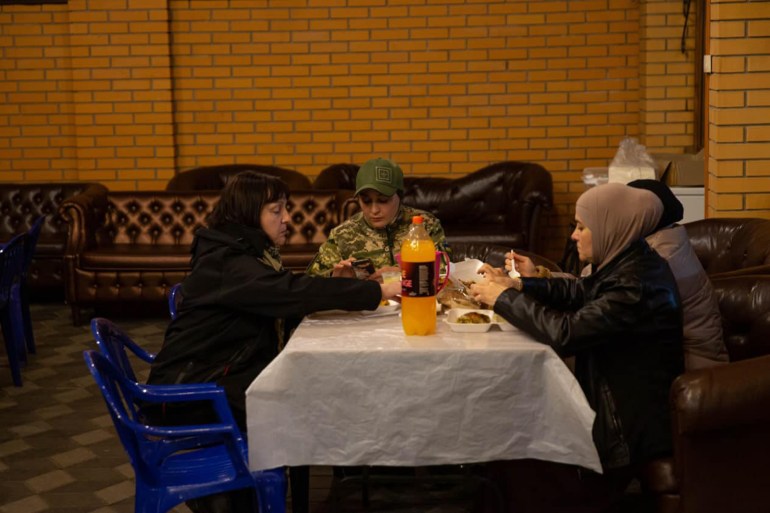Ukraine
- Ramadan is exceptional in difficult circumstances for the Muslims of Ukraine, during which the familiar atmosphere and activities of the month were absent, and instead the manifestations and repercussions of the Russian war on the country since February 24 attended.
Today there are no annual "Ramadan tents" in the square of the Islamic Cultural Center in the capital Kyiv, the headquarters of the Council of Muslims of Ukraine and the Religious Administration of Muslims of Ukraine (Ummah);
The number of visitors to the center dropped from thousands to dozens, even during the Friday prayers.
Ramadan activities for women, and Ramadan programs for children, were completely absent from Kyiv (communication sites)
The Ramadan activities for women and Ramadan programs for children were completely absent, and their usual noise was absent from the squares and mosques during the month.
Fasting in the midst of war
Everything in the main Islamic center in Ukraine reminds you today that the war is near and has not stopped, and that it is imposing itself on the lives of Muslims like others, even in their worship.
Everything in the main Islamic center in Ukraine reminds you today that the war is near and has not stopped (communication sites)
It has become common for the muezzin to stand in military clothing, and for the first row in prayer and sermons to include Muslim soldiers, and others who volunteered in the ranks of the "regional defense" forces auxiliary to the armed forces during the war.
They are also accustomed to the Mufti of the Religious Administration of the Muslims of Ukraine, Saeed Ismailov, taking off his military uniform to ascend the pulpit only on Fridays, before he wears it and puts the weapon next to him during prayers like others, and even while eating the humble breakfast, for the remaining Muslims of the city, And who was able to come to the center.
The military uniform is present at the breakfast of the Muslims of Ukraine (communication sites)
In an interview with Al Jazeera Net, Sheikh Ismailov pointed out that "about a thousand Muslims from Kyiv alone volunteered in the Regional Defense Forces, so they took up arms to stand guard at the checkpoints, and fight on the fronts."
"The number of Muslims has decreased in Kyiv and many cities due to the displacement, and this is reflected in the atmosphere of Ramadan, and the curfew prevents the establishment of Tarawih prayers in the capital and most cities, but we are trying to organize iftars and lessons that bring us together, and help us bear these difficult days together," he said.
Mufti of the Muslims of Ukraine Saeed Ismailov (center) during a Ramadan Iftar (communication sites)
Taraweeh returns to Lviv, but with a lump
Despite this sad image of the capital's Muslims, Kyiv's situation today remains better than others, especially after the withdrawal of Russian forces from its surroundings, and the decline in bombing operations.
In the cities and regions of Kharkiv, Sumy, Donetsk and Lugansk in the east of the country, as they were subjected to the heaviest bombardment, several Islamic centers and mosques were forced to close their doors, or open them for very short periods, in front of numbers that often do not exceed the fingers of two hands.
But postponing the start of the curfew until 11 pm local time in the "relatively safe" Lviv (western Ukraine) brought back to the city's Muslims some of the Ramadan atmosphere, starting with lessons and sermons, passing through group breakfasts, and ending with Tarawih prayers.
Sheikh Murad Suleymanov - imam of the Muhammad Asad Islamic Center in Lviv - says, "We live in a great blessing, but we cannot ignore a heartache, caused by the absence of thousands of Muslims from Lviv, especially from students who are accustomed to their activity, and here the sadness hangs over many Muslims who They fled to Lviv after being separated from their wives and children.
The situation of Muslims in Kyiv is relatively better than in other cities and regions in Ukraine (communication sites)
Positives from the womb of the crisis
However, a number of Muslim symbols in Ukraine believe that this "examination period" will pass, and some even talk about "positives" reflected in the crisis in the country.
Rustam Hasan al-Dinov, imam of the mosque of the Islamic Cultural Center in Sumy, told Al Jazeera Net, "Most Muslims were displaced from the city, and large parts of it were destroyed. Our center has turned into a shelter and assistance center, to distribute food and clothing to the needy, Muslims and non-Muslims, with the help of many benefactors. ".
Ramadan Iftar in Kyiv (networking sites)
Sheikh Saeed Ismailov, Mufti of the Muslims of Ukraine asserts, "The war is our unity, and it reflects the positive integration of Muslims into their society, and their concern for the security and safety of their country. Thousands of them are fighting, and thousands of others are active in large-scale voluntary field work, to serve soldiers and civilians, individually, or in the name of institutions and centers." Islamic".
He concluded by saying, "We ask God, with the blessings of this holy month, to speed up relief, and to protect Ukraine and its Muslims from all aggression and evil."

